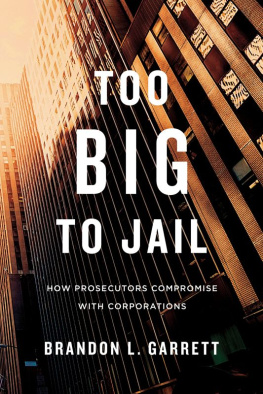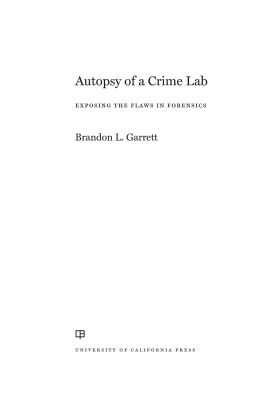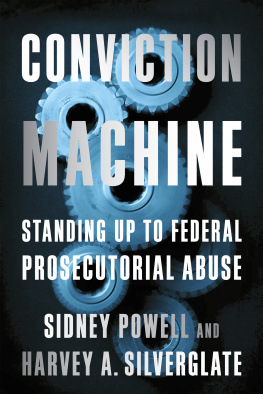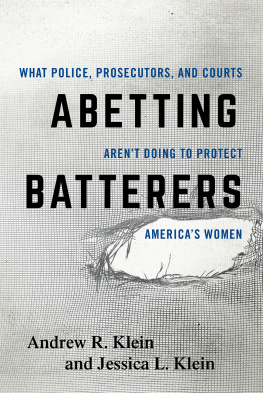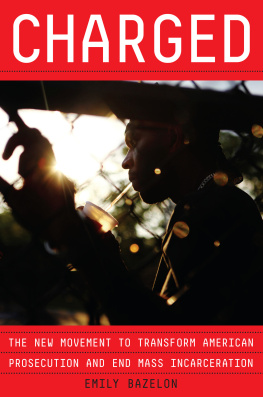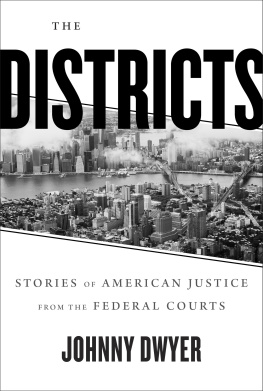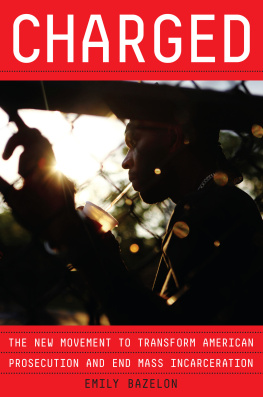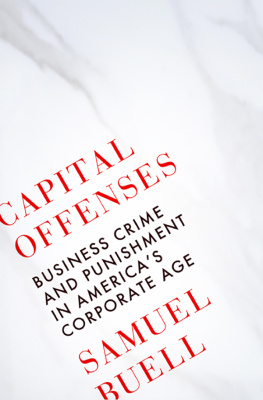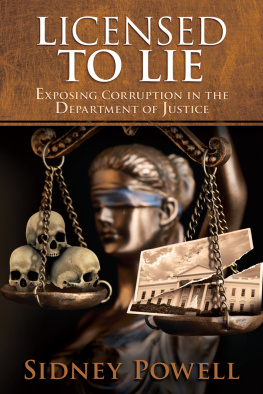TOO BIG TO JAIL
How Prosecutors Compromise with Corporations
BRANDON L. GARRETT
The Belknap Press of
Harvard University Press
Cambridge, Massachusetts
London, England
2014
Copyright 2014 by Brandon L. Garrett
All rights reserved
Jacket art: Getty Images
Jacket design: Graciela Galup
The Library of Congress has cataloged the printed edition as follows:
Garrett, Brandon, author.
Too big to jail : how prosecutors compromise with corporations / Brandon L. Garrett.
pages cm
Includes bibliographical references and index.
ISBN 978-0-674-36831-6 (hardcover : alk. paper)
978-0-674-73571-2 (pdf)
978-0-674-74461-5 (epub)
978-0-674-74462-2 (mobi)
1. Corporation lawUnited StatesCriminal provisions. 2. Tort liability of corporationsUnited States. 3. Corporate governanceLaw and legislationUnited States. 4. CorporationsCorrupt practicesUnited States. 5. Criminal liability of juristic personsUnited States. 6. ProsecutionUnited States. I. Title.
KF1301.A2G37 2014
345.73'0268dc23 2014013351
To Kerry
CONTENTS
- 1.
- 2.
- 3.
- 4.
- 5.
- 6.
- 7.
- 8.
- 9.
- 10.
ABA | American Bar Association |
CEO | Chief Executive Officer |
CFO | Chief Financial Officer |
CFTC | Commodities Futures Trading Commission |
DOJ | Department of Justice |
DPA | Deferred prosecution agreement |
ENRD | Environment and Natural Resources Division |
EPA | Environmental Protection Agency |
FBI | Federal Bureau of Investigation |
FCPA | Foreign Corrupt Practices Act |
FDA | Food and Drug Administration |
FDCA | Food, Drug, and Cosmetics Act |
FIRREA | Financial Institutions Reform, Recovery, and Enforcement Act |
GAO | General Accountability Office |
HHS-OIG | Department of Health and Human Services Office of Inspector General |
IRS | Internal Revenue Service |
LIBOR | London InterBank Offered Rate |
NPA | Non-prosecution agreement |
OCC | Office of the Comptroller of the Currency |
OSHA | Occupational Safety and Health Administration |
SEC | Securities and Exchange Commission |
1
I know what this is about. I have been expecting you.
It was not until 2006 that The Banker finally got the knock on his door. Six police officers and a prosecutor were standing there with an arrest warrant.
He later recalled, I was a true Siemens man, for sure. I was known as the keeper of the slush fund. We all knew what we were doing was illegal. The Banker was in charge of just some of the multinational bribery operations at Siemens Aktiengesellschaft, a German multinational firm, ranked in the top 50 of the Fortune Global 500 list of the worlds largest corporations. It has more than 400,000 employees in 190 countries and makes everything from trains to electrical power plants to home coffeemakers. Among its many activities was paying more than a billion dollars in bribes around the world to secure lucrative business from foreign governments. Now Siemens would be prosecuted, and not just in Germany but also in the United States.
This book is the first to take a close look at what happens when a company is prosecuted in the United States. A corporate prosecution is like a battle between David and Goliath. One would normally assume that federal prosecutors play the role of Goliath. They wield incredible power, with the ability to hold a corporation liable for a crime by even a single employee and the benefit of expansive federal criminal laws. It is hard to think of federal prosecutors as the little guy in any fight. Yet they may play the role of David when up against the largest and most powerful corporations in the world.
Some companies are not just too big to fail but also too big to jail: they are considered to be so valuable to the economy that prosecutors may not hold them accountable for their crimes. The expression too big to jail has mostly been used to refer to failures to prosecute Wall Street banks. A dismayed reaction to the lack of prosecutions after the last financial crisis is understandable, but to see why corporations may escape prosecution, it is important to understand exactly how a company can be prosecuted for a crime and the many practical challenges involved. The very idea that a corporation can be prosecuted for an employees crime seems odd on its face, and even among criminal lawyers, the topic of corporate crime had long been obscure. Over the past decade, corporate crime exploded in importancenot only because of greater public interest in accountability but also because prosecutors transformed their approach to targeting corporations.
In this book, I present data collected from more than a decade of cases to show what really happens when prosecutors pursue corporate criminals. I examine the terms of the deals that prosecutors now negotiate with companies, how prosecutors fine companies to punish them, the changes companies must make to prevent future crimes, and whether prosecutors pursue individual employees. The current approach to corporate prosecutions raises too big to jail concerns that extend beyond Wall Street banks to the cases brought against a wide range of companies. I argue that prosecutors fail to effectively punish the most serious corporate crimes. Still more troubling is that not enough is known about how to hold complex organizations accountable; prosecutors exacerbate that problem by settling corporate prosecutions without much transparency. My main goal in exploring the hidden world of corporate prosecutions is to encourage more public attention to the problem of punishing corporate crime. To go deeper inside the decision making of prosecutors and companies, in each chapter not only do I present data describing the larger patterns in corporate prosecutions and non-prosecutions, but I also tell the stories of how particular companies such as Siemens fared. The Siemens story is an important one to begin with: the case broke all records for the biggest prosecution for foreign bribery.
How were the Siemens bribes paid? The Banker did not pay them himself. True to his nickname, he instead organized the cash by transferring funds from anonymous bank accounts in Switzerland and Lichtenstein or using dummy corporations to hide where the money was coming from and where it was going. He explained how he carried the cash undetected: For a million euros, you dont need a big suitcase because the bills arent very big. A briefcase is enough200,000 euros isnt so much that you couldnt carry it in your coat pocket. In the countries where Siemens was pursuing lucrative government contractswhether it was Greece, Nigeria, Argentina, or Bangladeshexecutives hired consultants to help them win the government contracts. The consultants received a fee and personally delivered the bribes to government officials.
Siemens paid bribes around the worldmore than a billion dollars from 2002 to 2007. The Bankers division dealt with telecommunications and had a bribery budget of $4050 million a year. He recalled how the telecom unit was kept alive by bribes and how other major divisions at Siemens operated this way. Bribery was pervasive and common knowledge.

